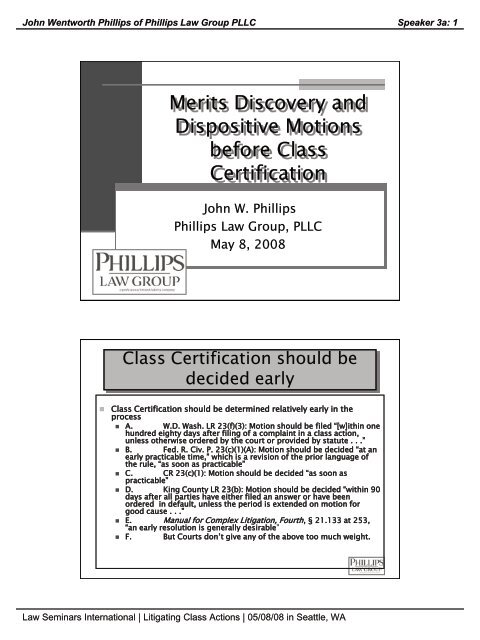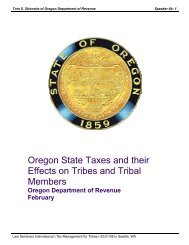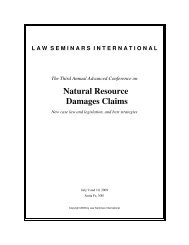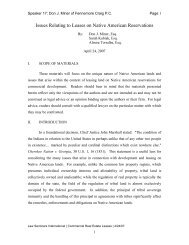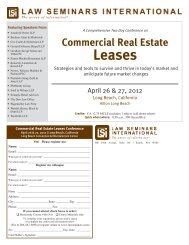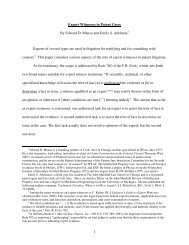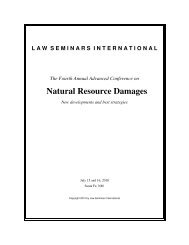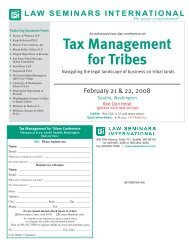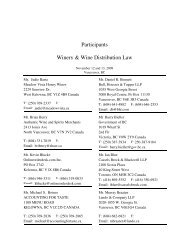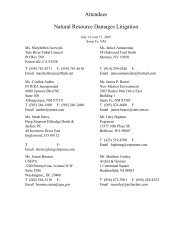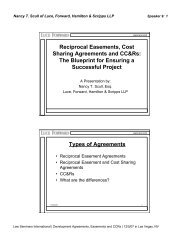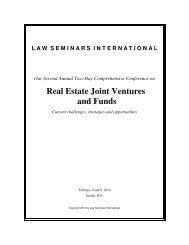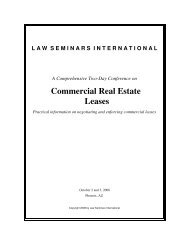Merits Discovery and Dispositive Motions before Class Certification
Merits Discovery and Dispositive Motions before Class Certification
Merits Discovery and Dispositive Motions before Class Certification
Create successful ePaper yourself
Turn your PDF publications into a flip-book with our unique Google optimized e-Paper software.
John Wentworth Phillips of Phillips Law Group PLLC Speaker 3a: 1<br />
<strong>Merits</strong> <strong>Discovery</strong> <strong>and</strong><br />
<strong>Dispositive</strong> <strong>Motions</strong><br />
<strong>before</strong> <strong>Class</strong><br />
<strong>Certification</strong><br />
John W. Phillips<br />
Phillips Law Group, PLLC<br />
May 8, 2008<br />
<strong>Class</strong> <strong>Certification</strong> should be<br />
decided early<br />
• <strong>Class</strong> <strong>Certification</strong> should be determined relatively early in the<br />
process<br />
• A. W.D. Wash. LR 23(f)(3): Motion should be filed “[w]ithin one<br />
hundred eighty days after filing of a complaint in a class action,<br />
unless otherwise ordered by the court or provided by statute . . .”<br />
• B. Fed. R. Civ. P. 23(c)(1)(A): Motion should be decided “at an<br />
early practicable time,” which is a revision of the prior language of<br />
the rule, “as soon as practicable”<br />
• C. CR 23(c)(1): Motion should be decided “as soon as<br />
practicable”<br />
• D. King County LR 23(b): Motion should be decided “within 90<br />
days after all parties have either filed an answer or have been<br />
ordered in default, unless the period is extended on motion for<br />
good cause . . .”<br />
• E. Manual for Complex Litigation, Fourth, § 21.133 at 253,<br />
“an early resolution is generally desirable”<br />
• F. But Courts don’t give any of the above too much weight.<br />
Law Seminars International | Litigating <strong>Class</strong> Actions | 05/08/08 in Seattle, WA
John Wentworth Phillips of Phillips Law Group PLLC Speaker 3a: 2<br />
Bifurcating <strong>Discovery</strong><br />
• What does limiting discovery to class certification<br />
issues really mean? <strong>Discovery</strong> of the plaintiffs<br />
regarding their representativeness <strong>and</strong> typicality,<br />
<strong>and</strong> very little discovery of the defendants?<br />
• Since a preliminary inquiry into the merits is<br />
required why isn’t merits discovery available to<br />
some degree?<br />
• Given the emphasis on “rigorous analysis” at the<br />
class certification stage <strong>and</strong> evaluation of the<br />
elements <strong>and</strong> evidence that will need to be adduced<br />
on the claim, is this distinction sensible?<br />
• Yes, where the facts <strong>and</strong> law are undisputed.<br />
• No, where the parties are going to fight about the<br />
nature of proof on elements of the claims. Manual for<br />
Complex Litigation, Fourth, § 21.14 at 255<br />
Bifurcating <strong>Discovery</strong><br />
• With respect to increasing dem<strong>and</strong>s on plaintiffs to<br />
prove-up class-wide damages at the class certification<br />
stage, does bifurcation of class certification vs. merits<br />
discovery make sense?<br />
• Can defendants credibly seek to bifurcate discovery<br />
(limiting discovery to “class certification” issues) <strong>and</strong> yet<br />
at the same time seek summary judgment against the<br />
name plaintiffs on the merits?<br />
• For these reasons, plaintiffs, particularly if they have<br />
dispositive motion plans of their own, generally don’t<br />
think such bifurcation makes sense, but given the<br />
generally early nature of class certification should limit<br />
the scope of discovery so that it is not too expensive for<br />
them or defendants <strong>before</strong> class certification.<br />
Law Seminars International | Litigating <strong>Class</strong> Actions | 05/08/08 in Seattle, WA
John Wentworth Phillips of Phillips Law Group PLLC Speaker 3a: 3<br />
<strong>Dispositive</strong> <strong>Motions</strong> <strong>before</strong><br />
<strong>Class</strong> <strong>Certification</strong><br />
• Judge Rothstein --Deal with dispositive issues<br />
early that may obviate lengthier <strong>and</strong> more<br />
expensive dem<strong>and</strong>s of class certification.<br />
Combining dispositive motions <strong>and</strong> class<br />
certification motions for simultaneous decision<br />
may define the l<strong>and</strong>scape for settlement.<br />
• Twombly et al invite early attack by defendants<br />
• There are more class actions in federal court<br />
post-CAFA (docket management)<br />
• Vague concerns about coercive effect of class<br />
certification <strong>and</strong> plaintiffs’ lawyers serving<br />
criminal sentences.<br />
<strong>Dispositive</strong> <strong>Motions</strong> Before<br />
<strong>Class</strong> <strong>Certification</strong><br />
• The above is not all bad for plaintiffs<br />
• Does my case have legs?<br />
• Do I have a dispositive motion to bring?<br />
• Any bar to doing so? (No, one-way intervention is not a<br />
problem)<br />
• Some cases have power as declaratory judgments<br />
decided on summary judgment irrespective of class<br />
treatment<br />
• Think through the ruling as it will work itself into class<br />
certification considerations<br />
• If the defendant brings an early dispositive motion <strong>and</strong> loses,<br />
plaintiff may have a good framework for discussing common<br />
issues on class certification.<br />
• Can a defendant bring a summary judgment motion at the<br />
same time it is resisting merits discovery?<br />
• Is the problem the plaintiff or the case? Dismissal as to the<br />
plaintiff does not bind a yet to be certified class.<br />
Law Seminars International | Litigating <strong>Class</strong> Actions | 05/08/08 in Seattle, WA


